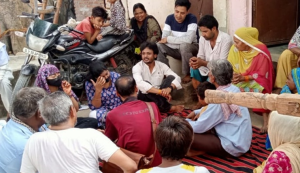IGSSS at 60 is a Frontline Responder
COVID-19 Relief Response
It has been more than two months since COVID-19 has been declared a pandemic. Other than the virus affecting people’s health, the much-required nationwide lockdown has added on to the crisis, exposing the marginalised communities to hunger, loss of livelihood and loss of dignity. IGSSS immediately responded to the crisis through relief measures like distribution of dry ration, sanitation kit, responding to distress calls, psychosocial counselling and awareness campaigns.
IGSSS team has made sure people in their rural project areas observe physical distancing while doing daily chores like filling up water, with the help of their partners they are providing masks and sanitisers/soaps in project areas, volunteers and Village Development Councils are overlooking migrant labourers who are in quarantine across the project areas.
Helping Communities
The months that COVID decided to knock at India’s doors were, unfortunately, the harvest months for rabi crops and non-farm produce mostly collected by the tribal in India.
Farmers who earned about Rs. 90,000 in two months (watermelon harvest) have been feeling helpless with little to no savings from previous months and no way to harvest or sell their current production. Whereas in Odisha, it has been estimated that 800,000 Tendu leaves pickers will lose Rs. 540 crores, due to this lockdown. Homeless section of the society who depend mostly on daily wages found themselves struggling for one meal a day. IGSSS, with its partners, is reaching out to these vulnerable communities with relief and recovery support.
Case from Odisha
In Kalahandi district of Odisha, the village development councils engaged with the state-level network “Forest-Based Livelihood Groups” and ensured that the farm produce is procured through Minimum Support Price and Pradhan Mantri Van Dhan Yojana.
In Kalahandi, IGSSS was able to support 67 farmers after proper advocacy with local administration. 42 out of these are vegetable farmers and have been linked with cooked food supply camps, now they can sell their produce weekly in nearby markets with the help of IGSSS volunteers. 35 are watermelon farmers who too have now been given access to nearby markets, Village Development Committees are helping them sell their produce to block approved vendors. Permission from authorities for these farmers to harvest in their farms keeping in mind the recommended physical distancing was procured.
IGSSS’ as Frontline Disaster Responder For 20 years
Over the past 20 years, it has become a mandate of the organisation to be vigilant towards responding swiftly to manmade and natural disasters. IGSSS takes into consideration the fact that providing only immediate relief is not enough, hence it moves a few steps forward by building the resilience of the disaster-hit areas, through livelihood recovery and rehabilitation, awareness building on food security, water and sanitation and pre-emptive longstanding interventions. Over the last 20 years, IGSSS has responded to disasters in different geographies across India.
Major Disasters Responded by IGSSS
Let’s go through the history of IGSSS acting as a frontline responder during disasters. Major disasters that we have responded are as follows:
1991 – Earthquake Rudraprayag, 1999 – Super Cyclone, 2004 – Tsunami, 2005 – Earthquake in Kashmir, 2013 Cyclone PHAILIN and subsequent floods, 2014 Assam-Ethnic Conflict Response, 2015 – Assam, West Bengal and Manipur floods and Landslides, 2016 – Manipur Earthquake, Tamilnadu Floods, 2018 – Kerala Floods and Landslides, 2019 – Cyclone Fani Odisha, Assam Floods, 2020 – COVID 19 Pandemic.
We also work on building disaster resilient communities by creating resilient infrastructure and community coping mechanisms. In Assam, we have built high rise platforms to take shelter during recurrent floods. In Odisha, we have strengthened the community by building their capacities to cope with disasters.
Principle and Values
IGSSS follows the core humanitarian principles and is fostering a very strong mechanism of accountability in the interventions. It might be true that a disaster doesn’t discriminate between different class and caste, but unfortunately, not all have a coping mechanism at the same/equal level. Hence, leaving no one behind is the value that we follow in all our responses.
Recognitions
IGSSS has been duly recognised for its work during disasters, In the last year we received the following accolades:
- IGSSS received appreciation mementoes from District Administration of Alleppey and Idukki recognizing its flood response work.
- IGSSS’s response received an award from the Hon’ble Governor of Odisha from Indian Red Cross Society, Odisha State Branch, in its Lessons Learnt Workshop
- IGSSS received 2nd position under the category of “Capacity development in Humanitarian, DRR and Development” for IGSSS good practice on “Barefoot veterinary Doctors” in the good practices from across Asia Region organized by The “Oxfam International’s Asia Regional Platform”, in partnership with “South Asia Together for Humanitarian Imperative-SATHI networks




